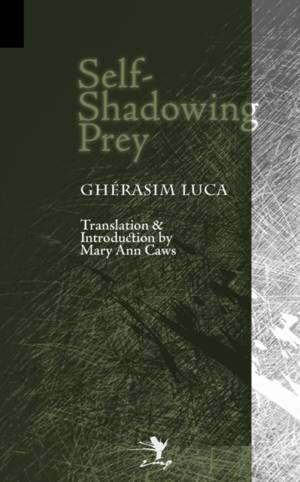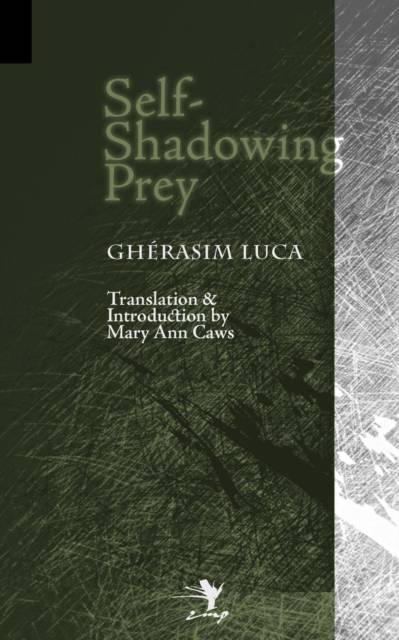
En raison d'une grêve chez bpost, votre commande pourrait être retardée. Vous avez besoin d’un livre rapidement ? Nos magasins vous accueillent à bras ouverts !
- Retrait gratuit dans votre magasin Club
- 7.000.000 titres dans notre catalogue
- Payer en toute sécurité
- Toujours un magasin près de chez vous
En raison de la grêve chez bpost, votre commande pourrait être retardée. Vous avez besoin d’un livre rapidement ? Nos magasins vous accueillent à bras ouverts !
- Retrait gratuit dans votre magasin Club
- 7.000.0000 titres dans notre catalogue
- Payer en toute sécurité
- Toujours un magasin près de chez vous
25,95 €
+ 51 points
Description
Self-Shadowing Prey, one of the final texts by the Romanian poet Ghérasim Luca (1913-1994), is clearly constructed around the sought complications of language. Embodying the surrealist operation of play with considerable exactitude and rigor, Self-Shadowing Prey is rich with neologistic stupors, nouns made verbs, and compelling repetitions and linguistic expansions. Language is not merely put into play but made to participate in an erotic act, and words become the locus of an exploding self. This linguistically-joyous text reveals the arresting syntactic creation and creative stammering which Deleuze and Guattari both saw in Luca and what led Deleuze to call him a great poet among the greatest. "If Ghérasim Luca's speech is eminently poetic," Deleuze pronounced, "it is because he makes stuttering an affect of language and not an affectation of speech. The entire language spins and varies in order to disengage a final block of sound, a single breath at the limit of the cry, JE T'AIME PASSIONNÉMENT." Transformed for the first time into English by distinguished translator Mary Ann Caws, this bi-lingual edition of Self-Shadowing Prey gives us yet one more important text by a key figure of the Romanian branch of Surrealism. In addition, it is the first book of Luca's verse ever to be translated into English. "Ghérasim Luca is a great poet among the greatest: he invented a prodigious stammering, his own." -Deleuze "Mary Ann Caws' passionate translations render deft, delightful facets of the formidable Ghérasim Luca: virile servings of refreshment and tumult, liberating language from the yoke of Duty. This collection pairs and contrasts well with the churning self-surgery we had the pleasure of smuggling from Romanian. Self-Shadowing Prey calls for vertiginous reading, in exhilarating reflection of the sonorous scintillations of Luca's own reading performances." -Julian and Laura Semilian, translators of Ghérasim Luca's The Inventor of Love & Other Works
Spécifications
Parties prenantes
- Auteur(s) :
- Editeur:
Contenu
- Nombre de pages :
- 248
- Langue:
- Anglais
Caractéristiques
- EAN:
- 9780983697213
- Date de parution :
- 30-03-12
- Format:
- Livre broché
- Format numérique:
- Trade paperback (VS)
- Dimensions :
- 127 mm x 203 mm
- Poids :
- 249 g

Les avis
Nous publions uniquement les avis qui respectent les conditions requises. Consultez nos conditions pour les avis.






